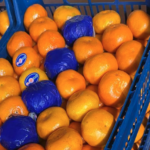Peru: ProCitrus expects mandarin access to Japan in 2017

The head of Peru's citrus industry body says solid progress is being made in opening up the Japanese market for mandarins, and believes access may well be gained sometime next year.
Speaking to www.freshfruitportal.com at the Expoalimentaria trade fair taking place in the capital Lima this week, Peruvian Citrus Growers Association (ProCitrus) general manager Sergio del Castillo said talks were in the advanced stages.
"The pest risk analysis has already been completed, and we’re now waiting for the phytosanitary requirements for mandarins," he said.
"The mandarin is classified as a sensitive product in Japan, so we need to be patient and wait for the country to finish the process. Our expectation is that next year we will gain mandarin market access to Japan."
A Japanese delegation is set for one more visit to Peru, which the ProCitrus head said could happen in April.
In terms of market potential, del Castillo said it was unlikely great volumes would be shipped to Japan, but he added it was a market of 'good prices and good quality'.
"We think that the volumes won’t be too high that we send to Japan. In the country there is declining demand for fruit. According to studies it is the older people who consumer more fruit, while the young are increasingly eating processed food," he said.
He added Japan could act as a 'reference market', demonstrating Peru's export credentials to other countries.
"If Peru can get its product there, we can show the world that we have a production of very high quality that is accepted in Japan, which is a very demanding market," he said.
While only around a quarter of Peru's mandarins are currently exported, del Castillo said this would increase in the near future as more and more growers who were focused on the domestic market have now planted varieties better suited to export.
Volumes falls short of expectations
As for the ending citrus campaign, del Castillo said the industry had failed to match pre-season growth expectations of 10% this year, with some spates of high temperatures causing issues for growers.
"We have a few moments of heat this campaign that reduced the amount of fruit. This has happened to a lot of countries affected by El Niño," he said.
"One problem of this heat is that it delays fruit coloring, and a second is that the reduces the acidity of the fruit very quickly. Thirdly, the heat puts stress and the citrus trees and lots of fruit just falls down to the soil.
"So all this generated fruit loss."
He added that the harvesting periods this season had been more concentrated, with growers acting to avoid further problems.
"Instead of having a long season, the fruit came out in reduced stages as because there was a danger the fruit would lose acidity and wouldn’t be marketable," he said.
"We still rose a bit, but we were expecting maybe 10% and it is now 2-3%."
Prices have also been 'stable and reasonable' both internationally and domestically, according to the representative.

















































